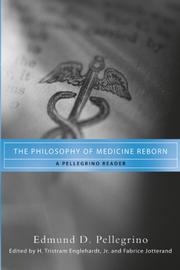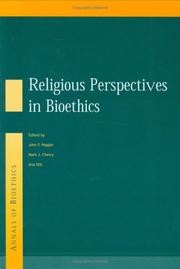| Listing 1 - 3 of 3 |
Sort by
|

ISBN: 0268038341 9780268038342 Year: 2008 Publisher: Notre Dame University of Notre Dame press
Abstract | Keywords | Export | Availability | Bookmark
 Loading...
Loading...Choose an application
- Reference Manager
- EndNote
- RefWorks (Direct export to RefWorks)
Medical ethics --- Medicine --- Philosophy


ISBN: 076580025X 0765806851 Year: 2001 Publisher: New Brunswick Transaction
Abstract | Keywords | Export | Availability | Bookmark
 Loading...
Loading...Choose an application
- Reference Manager
- EndNote
- RefWorks (Direct export to RefWorks)
Animal experimentation has made a crucial contribution to many of the most important advances in modern medicine. The development of vaccines for deadly viruses like rabies and yellow fever depended upon animal research, and much of our basic knowledge about human health and physiology was discovered through the use of animals as well. Inspite of these gains, animal rights activists have been zealous in communicating to the public and policymakers their view that the use of animals in medical research is morally wrong and should be severely curtailed or eliminated. The activists' arguments draw upon a range of disciplines and focus on both practical and ethical aspects of animal experimentation. Advocates of animal experimentation have been slow to respond to these arguments. Given that the worldwide toll of communicable diseases is still immense--and that deadly new pathogens may emerge at any time in the future to menace human health--failing to defend animal experimentation from the arguments of its opponents has disastrous implications. A quick response to an unanticipated threat on the order of the AIDS epidemic is unimaginable absent a vigorous research establishment, which in turn is dependent on animal proxies. This work is an attempt by research scientists and moral philosophers to mount a defence against animal rights enthusiasts. Contributors scrutinize how animal experimentation functions in the laboratory, the role that it plays in eradicating disease, and the moral justification for using animals. "Why Animal Experimentation Matters" is a first attempt by research scientists and moral philosophers to mount a convincing defense against animal rights enthusiasts. Because opponents of animal experimentation come from a variety of intellectual backgrounds, this defense is necessarily interdisciplinary as well. In this collection of eight essays, the authors scrutinize how animal experimentation actually functions in the laboratory, the vital role that it plays in palliating and eradicating human and animal diseases, and the moral justification for sacrificing animals for the betterment of human life. The subjects covered in the essays include the moral status of animals and persons, the importance of animals for advancing scientific knowledge, the history of animal experimentation (and of its detractors), differing theoretical approaches of American and European animal-experimentation regulations, the heavily restrictive legislation promoted by animal rights activists, and the threats posed to research and researchers by violent animal rights zealots. This important anthology will be of interest to scientists, philosophers, individuals suffering from heritable or communicable diseases, relatives of afflicted individuals, and policymakers.
Animal experimentation --- Animal models in research --- Animal welfare --- Animals --- Medicine --- Moral and ethical aspects. --- Treatment --- Research --- experiment, experimenteel onderzoek (dieren, dierproeven) --- medisch-wetenschappelijk onderzoek --- ethiek (ethische aspecten) --- expérimentation sur l'animal --- recherche médicale --- ethique (aspects ethiques) --- Health Workforce --- Biological models --- Laboratory animals --- Moral and ethical aspects --- Research&delete&


ISBN: 9789026519673 9026519672 9780415544139 0415544130 Year: 2004 Publisher: London : Taylor and Francis
Abstract | Keywords | Export | Availability | Bookmark
 Loading...
Loading...Choose an application
- Reference Manager
- EndNote
- RefWorks (Direct export to RefWorks)
Bioethics cannot be thought of as a primarily North American and Western European academic discipline. Bioethics has become a truly international phenomenon, moving beyond academic discussions into politics, social policy, and law. Religious Perspectives in Bioethics illustrates the diverse and wide ranging moral intuitions, premises, evaluations, and commitments of many of the world's religions. As such, it explores, documents and critically assesses the moral and cultural assumptions, central beliefs and values, epistemological and metaphysical understandings that underlie the bioethics of a wide range religions, from Buddhism, Daoism, Hinduism, and Sikhism, to Islam and Judaism, to the various Christian religions, including Eastern Orthodox, Roman Catholic, Lutheran, Episcopal, Southern Baptist, and Reformed Protestant. Religious Perspectives in Bioethics portrays the often widely divergent bioethical perspectives reflected throughout the international community's religions and cultures. Here one appreciates the significant plurality of fundamentally different, incompatible, and often mutually antagonistic moral visions and moral rationalities, within which complex bioethical issues are addressed. Religious Perspectives in Bioethics is the second of three foundational volumes, including Regional Perspectives in Bioethics and Legal Perspectives in Bioethics, which serve as precursors to the Annals of Bioethics Serial.
Bioethics --- Human Experimentation --- Cross-Cultural Comparison --- Religion --- Religious aspects
| Listing 1 - 3 of 3 |
Sort by
|

 Search
Search Feedback
Feedback About
About Help
Help News
News